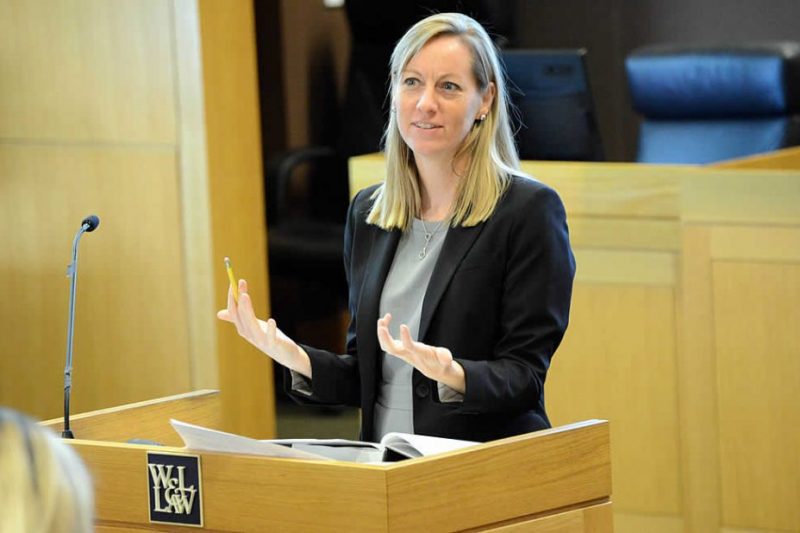
Elon Musk and the SEC: A Collision between an Unstoppable Force and an Immovable Object Law professor Karen Woody breaks down some of the history behind Elon Musk’s relationship with Twitter and the controversy surrounding the takeover of the company.
After several weeks of dramatic activity, Elon Musk has succeeded in purchasing Twitter, becoming the social media giant’s sole owner with the intention of making it a private company. Washington and Lee law professor Karen Woody, a corporate law expert who studies the SEC and insider trading, breaks down some of the history behind Musk’s actions and the controversy surrounding the takeover.
Twitter and Elon Musk have a bit of a history when it comes to the SEC. Can you explain how this past may have impacted what has transpired these last few weeks?
I have been tracking Musk’s entanglements with the SEC for some time, and this is not Musk’s first SEC-related issue to involve Twitter. Many will recall that back in 2018, Musk announced on Twitter that he was going to take Tesla private, using the words “funding secured” along with an apparent marijuana reference of pricing the shares at $420. People were not quite sure what was going on, but saying “funding secured” is a pretty clear statement of fact—it means “we have the money and we’re going private.” Of course, his tweet had a big impact on Tesla’s stock price, and the SEC came after Musk for a Rule 10b-5 violation because Musk had made a material misstatement of fact on behalf the company.
This dispute was eventually settled with both Musk and the company having to pay significant fines to the SEC, but the other important outcome is that the settlement agreement required a change in the governance structure at Tesla, creating a committee to review Musk’s tweets before he could send them out. Even though Musk signed this agreement, he was clearly upset by this arrangement, saying his First Amendment rights were being curtailed. He continued to say controversial things on Twitter that violated the SEC settlement agreement, and just a few months ago asked a judge to change the terms of the settlement. The judge declined. So, in some ways, it feels like the stage was set for what happened next.
Musk made headlines when it was revealed he had purchased a major stake in Twitter. What was controversial about his initial disclosure?
When Musk amassed a stake in Twitter greater than 5%, he was required to communicate that fact to the SEC through a filing. Initially, he disclosed his purchase of stocks through Schedule 13G, which is the form you use if you are planning to be a passive investor who will not attempt to exert control over the company. Musk amended his SEC filing to Schedule 13-D the next day—indicating that he was an activist investor intending to have some say in the operation of the company. This is what really got Twitter’s—and the world’s—attention.
Most controversial was the timing of the disclosure. The SEC gives an investor 10 days—a very long window—to make this disclosure, during which time an activist investor will buy as much stock as possible before the purchase becomes public and starts to impact stock prices. Musk waited an additional 11 days to notify the SEC, during which time he amassed over 9% of Twitter stock. When this became public, Twitter stock went up in price, and Musk immediately made millions, in part because he had an extra 11 days to buy stock at a lower price than it should have been. This is not a normal “foot fault” and given Musk’s history with the SEC, it is unlikely they will view this as an innocent mistake. The late filing was immediately labeled an attempt at stock manipulation, and Musk is currently the target of an insider trading lawsuit filed by a Twitter shareholder as a result.
After Musk’s ownership stake—and his plan to take over the company—was revealed, what did Twitter do to try to block Musk’s bid?
There is no question Musk is a major player on the platform with a lot to say about how he thinks it should work. So, Twitter first tried to keep him from amassing a bigger stake and to protect the company by giving he him seat on the board. That lasted one day. I think Musk realized he would be constrained by the fiduciary duties that come with board memberships—you can’t say bad things about the company that might harm its value if you are on the board. So, he resigned the board position and announced his intention to gain control of the company outright with a hostile takeover bid, making an above market-value offer on the company. This of course put the board in a tough spot. The directors are charged with protecting the company’s future but also with maximizing shareholder wealth. What grounds would they have to reject Musk’s offer if it would make shareholders a lot of money? On the other hand, I think the board had a pretty good defense that Musk’s mercurial nature and his ability to manipulate markets just by tweeting constitutes a real threat to the stability of the company. Be that as it may, the Board’s next response was a so-called “poison pill” defense, in this case flooding the market with Twitter shares to make it harder for anyone, including Musk, to buy enough shares to gain control of the company. My colleague Carliss Chatman spoke about this in more detail in a recent New York Times on this issue.
What ultimately compelled the Board to accept Musk’s offer to buy the company?
I imagine the Twitter board realized they were not going to outrun Musk. He has limitless funds, and is not a typical, or even rational, buyer. He is used to getting what he wants even if he will overpay. There remains a viable argument that the direction he will take the company is not in its best interest, but it seems the board did not want to take on that likely endless fight.
Is there anything in the history of M&A or corporate takeovers that is comparable to what we are seeing with Twitter and Musk?
There are a few unique characteristics with this purchase. One is that Musk is buying the company individually. This implicates his position and role with Tesla, SpaceX and his other ventures because it begs the question about whether he will be able to take on the job at Twitter. In addition, the personal nature of the buyout is different from Musk’s “peers” when they have ventured into other areas. For example, when Jeff Bezos acquired The Washington Post, as well as Whole Foods, those were acquisitions done by Amazon, not Bezos personally. Another unique characteristic about this particular scenario is the fact that Twitter itself is fairly unique as one of the most popular social media platforms. There are implications for the millions of users, as well as intense ethical issues regarding access to information and free speech. There certainly were people who were concerned when Bezos bought a preeminent newspaper in Washington; buying Twitter is much bigger than the Washington Post. This seems like another example of an amount of money available to only a few individuals on the planet who nonetheless are able to control the activities of the masses.
If you know any W&L faculty who would be great profile subjects, tell us about them! Nominate them for a web profile.
 Prof. Karen Woody
Prof. Karen Woody
You must be logged in to post a comment.